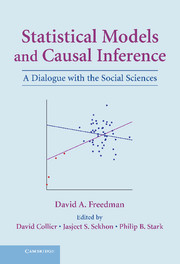Book contents
- Frontmatter
- Contents
- Preface
- Editors' Introduction: Inference and Shoe Leather
- Part I Statistical Modeling: Foundations and Limitations
- Part II Studies in Political Science, Public Policy, and Epidemiology
- Part III New Developments: Progress or Regress?
- 12 On Regression Adjustments in Experiments with Several Treatments
- 13 Randomization Does Not Justify Logistic Regression
- 14 The Grand Leap
- 15 On Specifying Graphical Models for Causation, and the Identification Problem
- 16 Weighting Regressions by Propensity Scores
- 17 On the So-Called “Huber Sandwich Estimator” and “Robust Standard Errors”
- 18 Endogeneity in Probit Response Models
- 19 Diagnostics Cannot Have Much Power Against General Alternatives
- Part IV Shoe Leather Revisited
- References and Further Reading
- Index
16 - Weighting Regressions by Propensity Scores
Published online by Cambridge University Press: 05 June 2012
- Frontmatter
- Contents
- Preface
- Editors' Introduction: Inference and Shoe Leather
- Part I Statistical Modeling: Foundations and Limitations
- Part II Studies in Political Science, Public Policy, and Epidemiology
- Part III New Developments: Progress or Regress?
- 12 On Regression Adjustments in Experiments with Several Treatments
- 13 Randomization Does Not Justify Logistic Regression
- 14 The Grand Leap
- 15 On Specifying Graphical Models for Causation, and the Identification Problem
- 16 Weighting Regressions by Propensity Scores
- 17 On the So-Called “Huber Sandwich Estimator” and “Robust Standard Errors”
- 18 Endogeneity in Probit Response Models
- 19 Diagnostics Cannot Have Much Power Against General Alternatives
- Part IV Shoe Leather Revisited
- References and Further Reading
- Index
Summary
Abstract. Regressions can be weighted by propensity scores in order to reduce bias. However, weighting is likely to increase random error in the estimates and to bias the estimated standard errors downward, even when selection mechanisms are well understood. Moreover, in some cases, weighting will increase the bias in estimated causal parameters. If investigators have a good causal model, it seems better just to fit the model without weights. If the causal model is improperly specified, there can be significant problems in retrieving the situation by weighting, although weighting may help under some circumstances.
Estimating causal effects is often the key to evaluating social programs, but the interventions of interest are seldom assigned at random. Observational data are therefore frequently encountered. In order to estimate causal effects from observational data, some researchers weight regressions using “propensity scores.” This simple and ingenious idea is due to Robins and his collaborators. If the conditions are right, propensity scores can be used to advantage when estimating causal effects.
However, weighting has been applied in many different contexts. The costs of misapplying the technique, in terms of bias and variance, can be serious. Many users, particularly in the social sciences, seem unaware of the pitfalls. Therefore, it may be useful to explain the idea and the circumstances under which it can go astray.
- Type
- Chapter
- Information
- Statistical Models and Causal InferenceA Dialogue with the Social Sciences, pp. 279 - 294Publisher: Cambridge University PressPrint publication year: 2009
- 1
- Cited by



